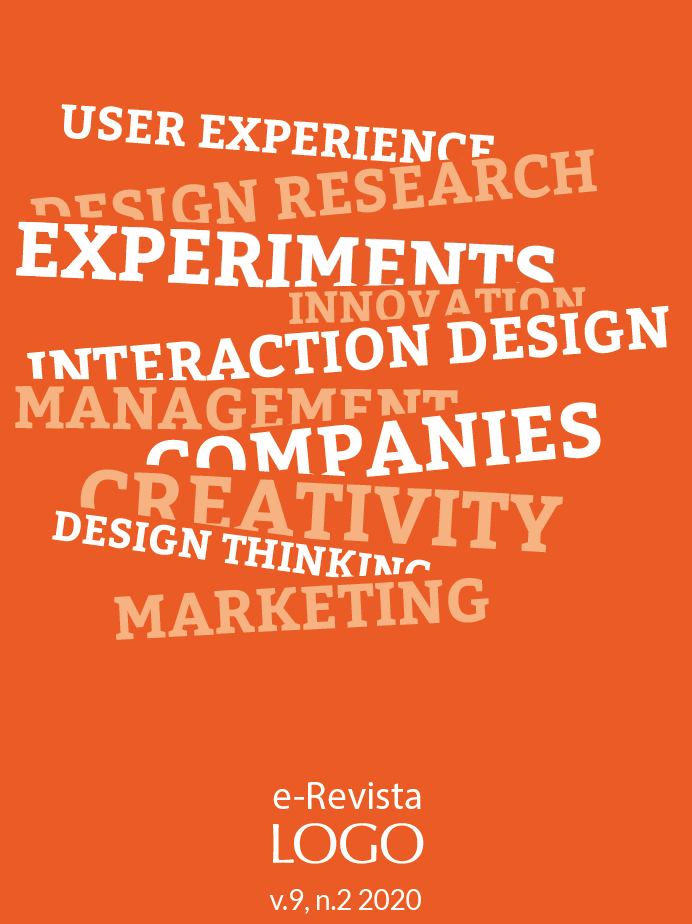Storytelling as a strategy for brand positioning
Palavras-chave:
Brand Positioning, Archetypes, Storytelling.Resumo
The failure in a clear positioning in brand communication, leads to the devaluation of the brand and the product. This article proposes guidelines for the positioning of a brand using the concepts of storytelling and archetypes. The methods used were a literature review and a case study. It results in the joint development between the designer, company and employees, in the identification of the target audience and stakeholders, the definition of roles within a narrative model and in the archetypal positionin
Referências
BEST, K. Design Management: Managing Design Strategy, Process and Implementation. Switzerland: AVA, 2006
LAKATOS, E. M.; MARCONI, M. A. Fundamentos de Metodologia do Trabalho CientÃfico. 7. Ed. – São Paulo: Atlas, 2010.
MARK, M.; PEARSON, C. S. O Herói e o Fora-da-Lei: como construir marcas extraordinárias usando o poder dos arquétipos. São Paulo, 2016.
MARTIN, R. The design of business: Why design thinking is the next competitive advantage. Boston: Harvard Bussiness Press, 2009.
MARTINS, R. F. F.; MERINO, E. A. D. A gestão de design como Estratégia Organizacional. Rosane Fonseca de Freitas, Eugenio Andrés Diáz Merino. 2. Ed. - Londrina: EDUEL; Rio de Janeiro: Rio Books, 2011.
MAZUR, L. Conversas com os mestres do Marketing. São Paulo: Editora Gente, 2010.
MOZOTA, B. B. Gestão do Design: usando o Design para construir valor na marca e inovação corporativa. Porto Alegre. Bookman, 2011.
NEUMEIER, M. The Brand Flip: Why customers now run companies and how to profit from it. New Riders, 2015.
OSTERWALDER, A.; PIGNEUR, Y.; BERNARDO, G.; SMITH, A. Value Proposition Design: como construir propostas de valor inovadoras. São Paulo: HSM, 2011
POUPART, J. A pesquisa qualitativa: enfoques epistemológicos e metodológicos. Petrópolis (RJ): Vozes, 2008.
RICHARDSON, R. J. Pesquisa social: métodos e técnicas. 4. Ed. Rio de Janeiro. 2AB, 2009.
SLADE-BROOKING, C. Creating a brand identity: a guide for designers. Laurence King Publishing Ltd, 2016.
STAKE, R. E. Pesquisa qualitativa: estudando como as coisas funcionam. Robert E. Stake; tradução: Karla Reis: revisão técnica: Nilda Jacks – Porto Alegre: Penso; 2011.
FOG, Kl.; BUDTZ, C.; YAKABOYLU, B. Storytelling: branding in practice. New York: Springer, 2005.
TOMIYA, E. Gestão do Valor da Marca: como criar e gerenciar marcas valiosas. Rio de Janeiro: Editora Senac Rio, 2010.
WHEELER, A. Design de identidade da Marca. Porto Alegre: Bookman: 2ª ed., 2008.
ZOGBI, E. Posicionamento, a identidade da empresa. São Paulo: Atlas, 2013.
---
Downloads
Publicado
Edição
Seção
Licença
This journal, following the recommendations of the Open Access movement, provides public access to all its content, following the principle that free access to research generates a greater global exchange of knowledge. Such access is associated with the reading and citing an author's work.
The author must ensure:
-
that there is a full consensus of all co-authors in approving the final version of the document and its submission for publication.
-
that their work is original, and if the work and / or words of other people were used, they were duly recognized.
Plagiarism in all its forms constitute unethical publication behavior and is unacceptable.
The articles and other published works, become the property of the journal.
The contents of e-Journal LOGO are licensed under a Creative Commons License 4.0 by. It reserves the right to use software or other methods of detecting plagiarism to analyze the submitted works.
Under the license you have the right to:
- Share - copy and redistribute the material in any media or format
- Adapt - remix, transform, and create from material to any purpose, even if commercial.
- The licensor can not revoke these rights as long as you respect the license terms.
According to the following terms:
- Assignment - You must give the appropriate credit, provide a link to the license and indicate if changes have been made. You must do so in any reasonable circumstance, but in no way do you suggest to the licensor to support you or your use.
- No additional restrictions - You may not apply legal terms or technological measures that legally restrict others from doing anything that the license permits.
The authors of papers submitted to the e-Journal LOGO authorize their publication in physical and electronic media for academic purposes. The authors also agree on the distribution of articles by national and international indexing databases, whether or not for profit, and can be reproduced as long as the source is cited.
O autor deve garantir:
- que haja um consenso completo de todos os coautores em aprovar a versão final do documento e sua submissão para publicação.
- que seu trabalho é original, e se o trabalho e/ou palavras de outras pessoas foram utilizados, estas foram devidamente reconhecidos.
Plágio em todas as suas formas constituem um comportamento antiético de publicação e é inaceitável.
Os artigos e demais trabalhos publicados, passam a ser propriedade da revista.
Os conteúdos de e-Revista LOGO estão licenciados sob uma Licença Creative Commons 4.0 by. Reserva-se o direito de usar software ou otros métodos de detecção de plágio para analisar os trabalhos submetidos.
Segundo a licença você tem direito de:
- Compartilhar — copiar e redistribuir o material em qualquer suporte ou formato
- Adaptar — remixar, transformar, e criar a partir do material para qualquer fim, mesmo que comercial.
- O licenciante não pode revogar estes direitos desde que você respeite os termos da licença.
De acordo com os termos seguintes:
- Atribuição — Você deve dar o crédito apropriado, prover um link para a licença e indicar se mudanças foram feitas. Você deve fazê-lo em qualquer circunstância razoável, mas de maneira alguma que sugira ao licenciante a apoiar você ou o seu uso.
- Sem restrições adicionais — Você não pode aplicar termos jurídicos ou medidas de caráter tecnológico que restrinjam legalmente outros de fazerem algo que a licença permita.


